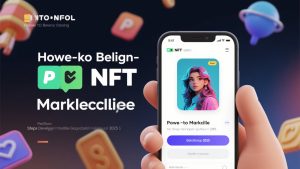How to Build a Profitable NFT Marketplace: Step-by-Step Development Guide for 2025
Architecting the Next-Generation NFT Trading Platform
The foundation of any successful NFT marketplace development project begins with selecting the appropriate blockchain infrastructure. In 2025, developers face critical decisions between monolithic chains like Ethereum and modular architectures such as Celestia or Polygon CDK. The technical stack must support atomic swaps across multiple chains while maintaining sub-second finality for high-frequency trading. Smart contract architecture requires particular attention – the most secure implementations use proxy patterns with upgradeable logic contracts, allowing for security patches without disrupting marketplace operations. Storage solutions have evolved beyond IPFS, with decentralized alternatives like Arweave and Filecoin now offering permanent data availability guarantees essential for high-value digital assets.
Payment processing represents another core challenge, where integrating a robust blockchain payment gateway can significantly impact user conversion rates. Modern solutions support hybrid transactions, allowing buyers to pay in stablecoins while sellers receive fiat through automated settlement mechanisms. The most sophisticated platforms implement dynamic fee structures that adjust based on network congestion, asset class, and user loyalty tiers. Compliance infrastructure must handle FATF Travel Rule requirements across jurisdictions while maintaining pseudonymity where legally permitted. Advanced platforms now incorporate machine learning models that detect suspicious transaction patterns in real-time, reducing fraud losses by up to 40% compared to traditional rule-based systems.
Risk mitigation through comprehensive NFT business insurance coverage has become non-negotiable for professional marketplaces. Underwriters now offer specialized policies covering smart contract exploits, oracle failures, and even governance attacks. Premium structures typically range from 2-7% of covered assets, with discounts available for platforms that implement formal verification of their smart contracts. The insurance application process requires detailed technical documentation, including third-party audit reports, incident response plans, and proof of cold storage procedures for platform-owned assets. Leading marketplaces now display their insurance coverage prominently as a competitive differentiator, particularly when targeting institutional clients.
Monetization Strategies for Sustainable Growth
Establishing diversified revenue streams begins with configuring a flexible crypto merchant account infrastructure. Beyond traditional transaction fees (typically 1-3%), successful platforms generate substantial income through premium services like verified collections, featured listings, and advanced analytics subscriptions. The most profitable marketplaces implement dynamic pricing models where fees adjust based on real-time demand signals – a technique borrowed from traditional financial exchanges. Secondary market operations often contribute 60-70% of total revenue, emphasizing the importance of fostering liquid trading environments through market maker incentives and liquidity mining programs.
Advertising integration presents another lucrative opportunity when executed properly. Rather than intrusive banners, top platforms incorporate native sponsorship placements that align with user interests – for example, highlighting relevant NFT marketplace development tools for creators or tax software for collectors. These contextual ads command premium CPM rates while maintaining user experience quality. The most sophisticated platforms use on-chain data to build detailed user profiles, enabling hyper-targeted advertising without compromising wallet privacy. Ad revenue typically accounts for 15-25% of total income for established marketplaces, with top-performing ad units focusing on financial services and creator tools.
Enterprise services represent the highest-margin revenue stream for professional platforms. Custom blockchain payment gateway integrations for brands, white-label marketplace solutions, and API access for institutional traders can generate six-figure annual contracts. The most successful platforms dedicate entire business units to these high-touch clients, offering SLAs for transaction execution speed and dedicated support channels. These premium services often include compliance consulting, helping traditional brands navigate the regulatory complexities of digital asset commerce. Enterprise clients typically contribute 30-40% of revenue while representing less than 5% of total users, making them crucial for sustainable growth.
Optimizing the Collector Experience
User acquisition costs in the NFT space have skyrocketed, making retention optimization critical for profitability. The most effective platforms implement sophisticated onboarding flows that educate new users about crypto merchant account options and security best practices without overwhelming them. Progressive disclosure techniques work particularly well, revealing advanced features as users demonstrate platform familiarity. Gamification elements like achievement badges and collector scoreboards can increase 30-day retention by up to 40%, especially when tied to tangible benefits like fee discounts.

Discovery tools represent another key differentiator in crowded marketplaces. Beyond basic search functionality, leading platforms incorporate AI-powered recommendation engines that analyze collecting patterns across millions of wallets. Visual search capabilities allow users to find similar artworks by uploading images, while social graph analysis surfaces trending collections before they appear on public leaderboards. These tools dramatically reduce the time collectors spend finding relevant assets, directly correlating with platform stickiness. The most advanced implementations use predictive algorithms to notify users about upcoming drops matching their established preferences.
Security infrastructure remains the most crucial aspect of user experience. While NFT business insurance provides financial protection, preventing incidents through robust technical controls is far preferable. Modern marketplaces implement multi-factor authentication that works across decentralized identifiers, transaction simulation before signing, and real-time phishing detection. The most security-conscious platforms offer institutional-grade custody options including multi-sig vaults and time-delayed withdrawals. These features prove particularly valuable for high-net-worth collectors and corporate clients, often justifying premium fee structures.
